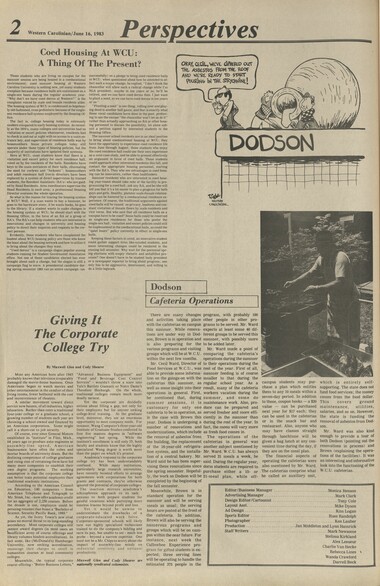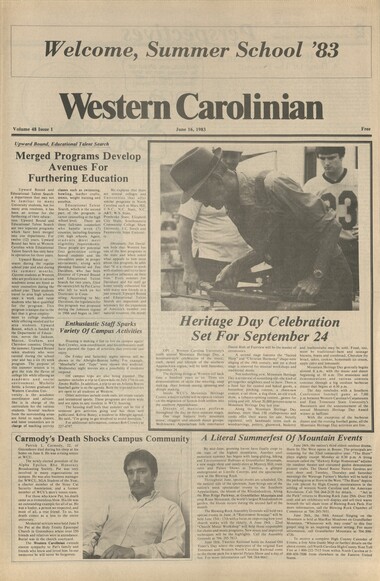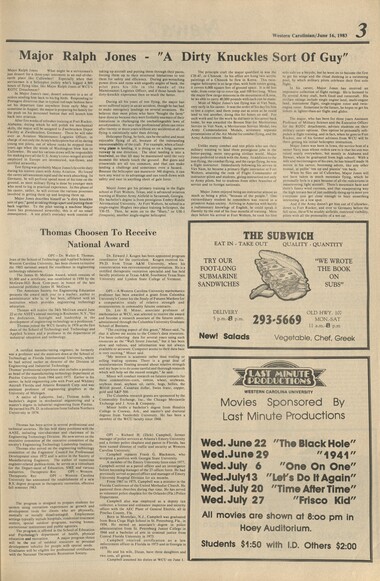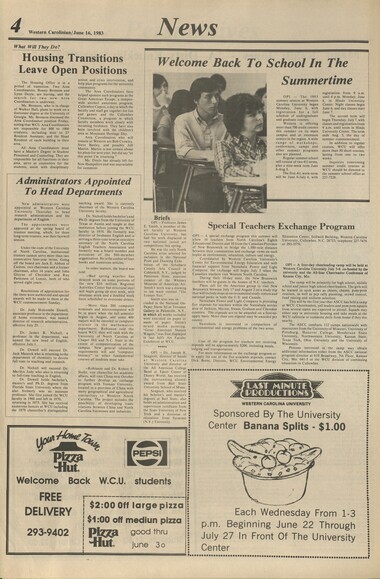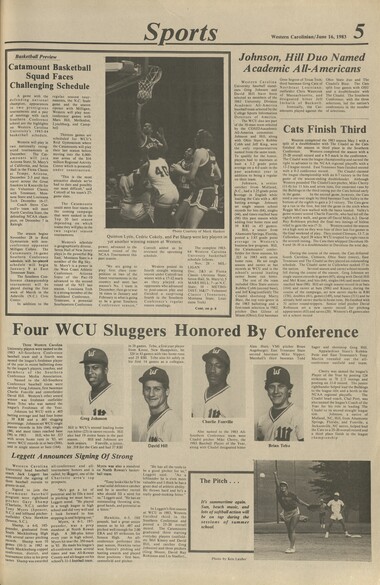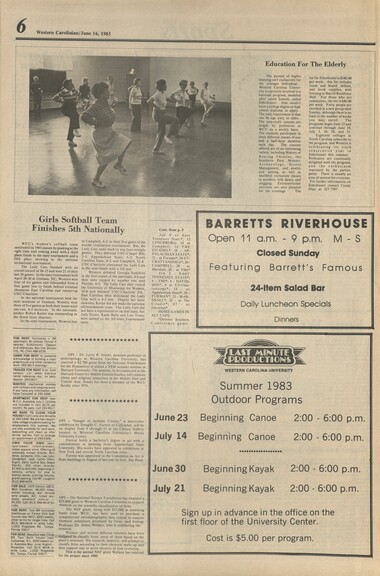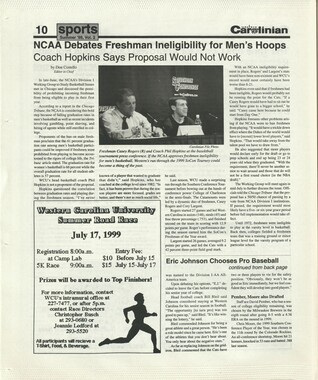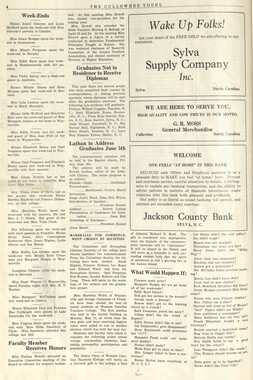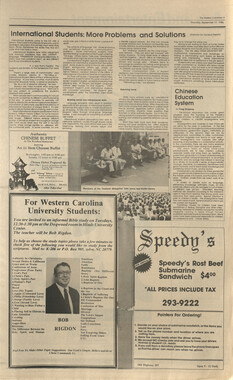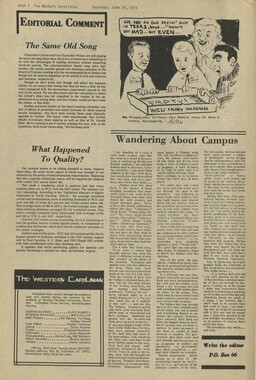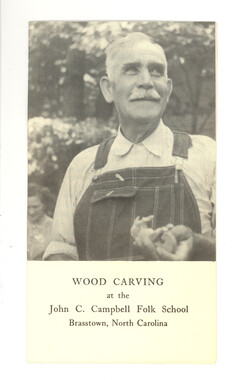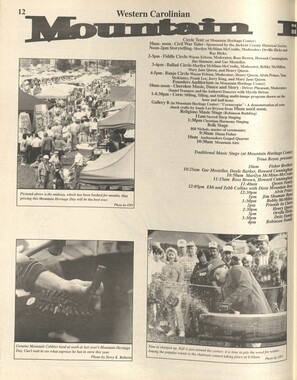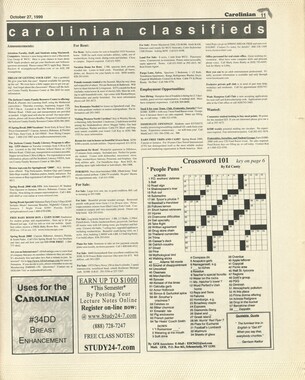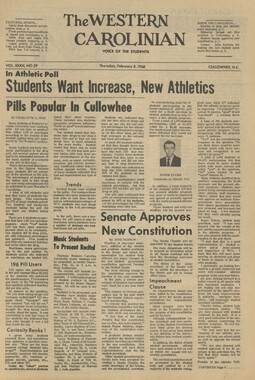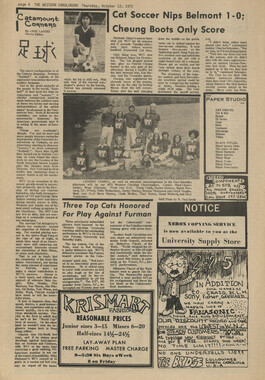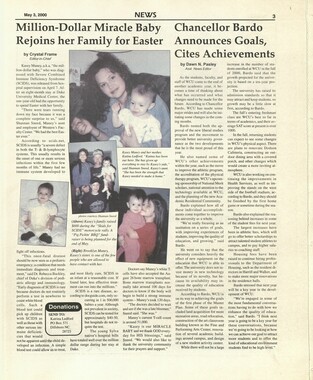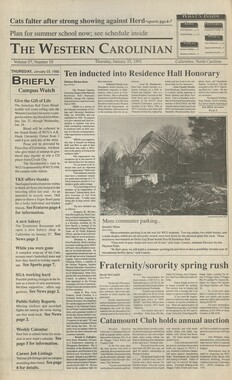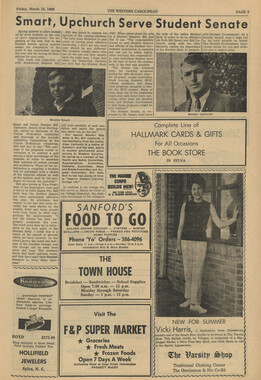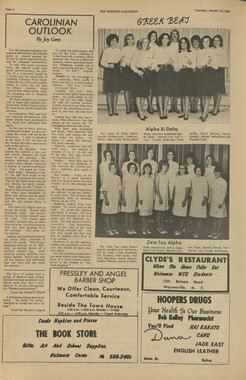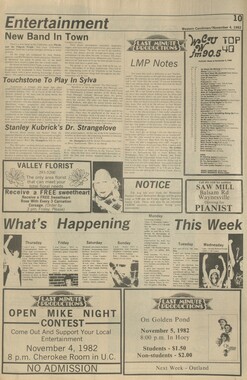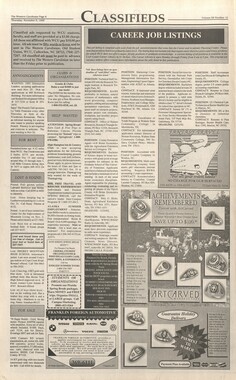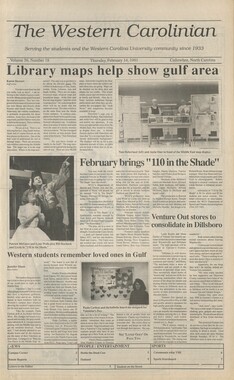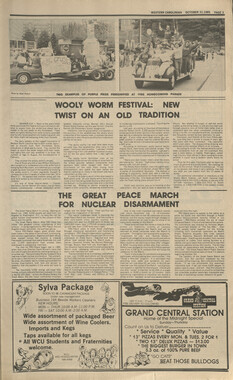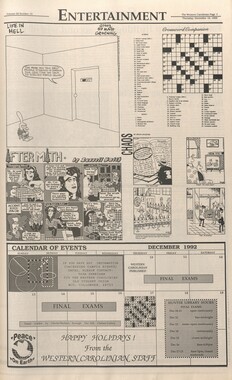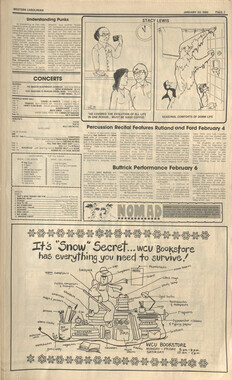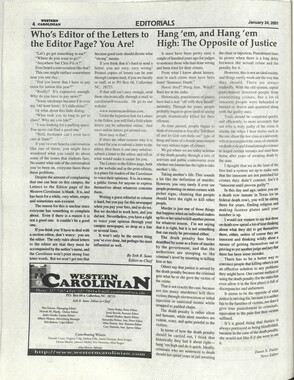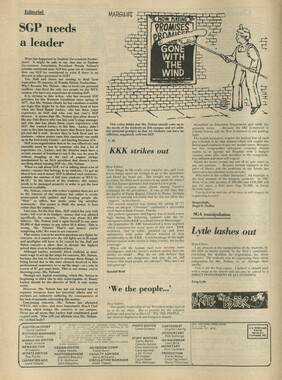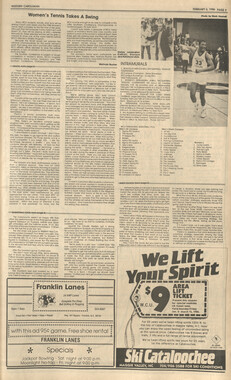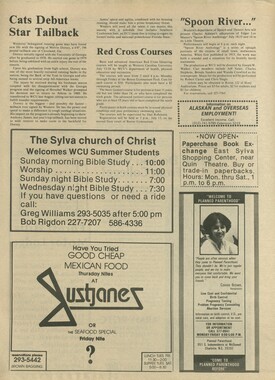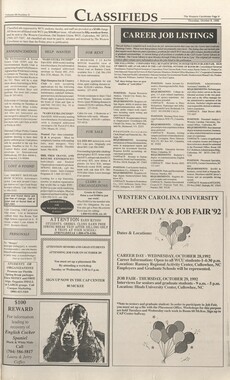Western Carolina University (20)
View all
- Canton Champion Fibre Company (2308)
- Cherokee Traditions (293)
- Civil War in Southern Appalachia (165)
- Craft Revival (1942)
- Great Smoky Mountains - A Park for America (2767)
- Highlights from Western Carolina University (430)
- Horace Kephart (941)
- Journeys Through Jackson (154)
- LGBTQIA+ Archive of Jackson County (19)
- Oral Histories of Western North Carolina (314)
- Picturing Appalachia (6679)
- Stories of Mountain Folk (413)
- Travel Western North Carolina (160)
- Western Carolina University Fine Art Museum Vitreograph Collection (129)
- Western Carolina University Herbarium (92)
- Western Carolina University: Making Memories (708)
- Western Carolina University Publications (2283)
- Western Carolina University Restricted Electronic Theses and Dissertations (146)
- Western North Carolina Regional Maps (71)
- World War II in Southern Appalachia (131)
University of North Carolina Asheville (6)
View all
- Allanstand Cottage Industries (62)
- Appalachian National Park Association (53)
- Bennett, Kelly, 1890-1974 (1295)
- Berry, Walter (76)
- Brasstown Carvers (40)
- Carver, George Washington, 1864?-1943 (26)
- Cathey, Joseph, 1803-1874 (1)
- Champion Fibre Company (233)
- Champion Paper and Fibre Company (297)
- Cherokee Indian Fair Association (16)
- Cherokee Language Program (22)
- Crowe, Amanda (40)
- Edmonston, Thomas Benton, 1842-1907 (7)
- Ensley, A. L. (Abraham Lincoln), 1865-1948 (275)
- Fromer, Irving Rhodes, 1913-1994 (70)
- George Butz (BFS 1907) (46)
- Goodrich, Frances Louisa (120)
- Grant, George Alexander, 1891-1964 (96)
- Heard, Marian Gladys (60)
- Kephart, Calvin, 1883-1969 (15)
- Kephart, Horace, 1862-1931 (313)
- Kephart, Laura, 1862-1954 (39)
- Laney, Gideon Thomas, 1889-1976 (439)
- Masa, George, 1881-1933 (61)
- McElhinney, William Julian, 1896-1953 (44)
- Niggli, Josephina, 1910-1983 (10)
- North Carolina Park Commission (105)
- Osborne, Kezia Stradley (9)
- Owens, Samuel Robert, 1918-1995 (11)
- Penland Weavers and Potters (36)
- Roberts, Vivienne (15)
- Roth, Albert, 1890-1974 (142)
- Schenck, Carl Alwin, 1868-1955 (1)
- Sherrill's Photography Studio (2565)
- Southern Highland Handicraft Guild (127)
- Southern Highlanders, Inc. (71)
- Stalcup, Jesse Bryson (46)
- Stearns, I. K. (213)
- Thompson, James Edward, 1880-1976 (226)
- United States. Indian Arts and Crafts Board (130)
- USFS (683)
- Vance, Zebulon Baird, 1830-1894 (1)
- Weaver, Zebulon, 1872-1948 (58)
- Western Carolina College (230)
- Western Carolina Teachers College (282)
- Western Carolina University (1794)
- Western Carolina University. Mountain Heritage Center (18)
- Whitman, Walt, 1819-1892 (10)
- Wilburn, Hiram Coleman, 1880-1967 (73)
- Williams, Isadora (3)
- Cain, Doreyl Ammons (0)
- Crittenden, Lorraine (0)
- Rhodes, Judy (0)
- Smith, Edward Clark (0)
- Appalachian Region, Southern (2393)
- Asheville (N.C.) (1886)
- Avery County (N.C.) (26)
- Blount County (Tenn.) (161)
- Buncombe County (N.C.) (1664)
- Cherokee County (N.C.) (283)
- Clay County (N.C.) (555)
- Graham County (N.C.) (233)
- Great Smoky Mountains National Park (N.C. and Tenn.) (478)
- Haywood County (N.C.) (3522)
- Henderson County (N.C.) (70)
- Jackson County (N.C.) (4692)
- Knox County (Tenn.) (25)
- Knoxville (Tenn.) (12)
- Lake Santeetlah (N.C.) (10)
- Macon County (N.C.) (420)
- Madison County (N.C.) (211)
- McDowell County (N.C.) (39)
- Mitchell County (N.C.) (132)
- Polk County (N.C.) (35)
- Qualla Boundary (981)
- Rutherford County (N.C.) (76)
- Swain County (N.C.) (2020)
- Transylvania County (N.C.) (247)
- Watauga County (N.C.) (12)
- Waynesville (N.C.) (68)
- Yancey County (N.C.) (72)
- Aerial Photographs (3)
- Aerial Views (60)
- Albums (books) (4)
- Articles (1)
- Artifacts (object Genre) (228)
- Biography (general Genre) (2)
- Cards (information Artifacts) (38)
- Clippings (information Artifacts) (191)
- Crafts (art Genres) (622)
- Depictions (visual Works) (21)
- Design Drawings (1)
- Drawings (visual Works) (184)
- Envelopes (73)
- Facsimiles (reproductions) (1)
- Fiction (general Genre) (4)
- Financial Records (12)
- Fliers (printed Matter) (67)
- Glass Plate Negatives (381)
- Guidebooks (2)
- Internegatives (10)
- Interviews (811)
- Land Surveys (102)
- Letters (correspondence) (1013)
- Manuscripts (documents) (619)
- Maps (documents) (159)
- Memorandums (25)
- Minutes (administrative Records) (59)
- Negatives (photographs) (5735)
- Newsletters (1285)
- Newspapers (2)
- Occupation Currency (1)
- Paintings (visual Works) (1)
- Pen And Ink Drawings (1)
- Periodicals (193)
- Personal Narratives (7)
- Photographs (12982)
- Plans (maps) (1)
- Poetry (5)
- Portraits (1657)
- Postcards (329)
- Programs (documents) (151)
- Publications (documents) (2237)
- Questionnaires (65)
- Scrapbooks (282)
- Sheet Music (1)
- Slides (photographs) (402)
- Sound Recordings (796)
- Specimens (92)
- Speeches (documents) (15)
- Tintypes (photographs) (8)
- Transcripts (322)
- Video Recordings (physical Artifacts) (23)
- Vitreographs (129)
- Text Messages (0)
- A.L. Ensley Collection (275)
- Appalachian Industrial School Records (7)
- Appalachian National Park Association Records (336)
- Axley-Meroney Collection (2)
- Bayard Wootten Photograph Collection (20)
- Bethel Rural Community Organization Collection (7)
- Blumer Collection (5)
- C.W. Slagle Collection (20)
- Canton Area Historical Museum (2110)
- Carlos C. Campbell Collection (282)
- Cataloochee History Project (65)
- Cherokee Studies Collection (4)
- Daisy Dame Photograph Album (5)
- Daniel Boone VI Collection (1)
- Doris Ulmann Photograph Collection (112)
- Elizabeth H. Lasley Collection (1)
- Elizabeth Woolworth Szold Fleharty Collection (4)
- Frank Fry Collection (95)
- George Masa Collection (173)
- Gideon Laney Collection (452)
- Hazel Scarborough Collection (2)
- Hiram C. Wilburn Papers (28)
- Historic Photographs Collection (236)
- Horace Kephart Collection (861)
- Humbard Collection (33)
- Hunter and Weaver Families Collection (1)
- I. D. Blumenthal Collection (4)
- Isadora Williams Collection (4)
- Jesse Bryson Stalcup Collection (47)
- Jim Thompson Collection (224)
- John B. Battle Collection (7)
- John C. Campbell Folk School Records (80)
- John Parris Collection (6)
- Judaculla Rock project (2)
- Kelly Bennett Collection (1314)
- Love Family Papers (11)
- Major Wiley Parris Civil War Letters (3)
- Map Collection (12)
- McFee-Misemer Civil War Letters (34)
- Mountain Heritage Center Collection (4)
- Norburn - Robertson - Thomson Families Collection (44)
- Pauline Hood Collection (7)
- Pre-Guild Collection (2)
- Qualla Arts and Crafts Mutual Collection (12)
- R.A. Romanes Collection (681)
- Rosser H. Taylor Collection (1)
- Samuel Robert Owens Collection (94)
- Sara Madison Collection (144)
- Sherrill Studio Photo Collection (2558)
- Smoky Mountains Hiking Club Collection (616)
- Stories of Mountain Folk - Radio Programs (374)
- The Reporter, Western Carolina University (510)
- Venoy and Elizabeth Reed Collection (16)
- WCU Gender and Sexuality Oral History Project (32)
- WCU Mountain Heritage Center Oral Histories (25)
- WCU Oral History Collection - Mountain People, Mountain Lives (71)
- WCU Students Newspapers Collection (1744)
- Western North Carolina Tomorrow Black Oral History Project (69)
- William Williams Stringfield Collection (2)
- Zebulon Weaver Collection (109)
- African Americans (388)
- Appalachian Trail (35)
- Artisans (521)
- Cherokee art (84)
- Cherokee artists -- North Carolina (10)
- Cherokee language (21)
- Cherokee pottery (101)
- Cherokee women (208)
- Church buildings (166)
- Civilian Conservation Corps (U.S.) (110)
- College student newspapers and periodicals (1830)
- Dams (95)
- Dance (1023)
- Education (222)
- Floods (60)
- Folk music (1015)
- Forced removal, 1813-1903 (2)
- Forest conservation (220)
- Forests and forestry (917)
- Gender nonconformity (4)
- Great Smoky Mountains National Park (N.C. and Tenn.) (154)
- Hunting (38)
- Landscape photography (10)
- Logging (103)
- Maps (84)
- Mines and mineral resources (8)
- North Carolina -- Maps (18)
- Paper industry (38)
- Postcards (255)
- Pottery (135)
- Railroad trains (69)
- Rural electrification -- North Carolina, Western (3)
- School integration -- Southern States (2)
- Segregation -- North Carolina, Western (5)
- Slavery (5)
- Sports (452)
- Storytelling (245)
- Waterfalls -- Great Smoky Mountains (N.C. and Tenn.) (66)
- Weaving -- Appalachian Region, Southern (280)
- Wood-carving -- Appalachian Region, Southern (328)
- World War, 1939-1945 (173)
Western Carolinian Volume 48 Number 01
Item
Item’s are ‘child’ level descriptions to ‘parent’ objects, (e.g. one page of a whole book).
-
-
2 Western Carolinian/June 16, 1983 Coed Housing At WCU: A Thing Of The Present? Perspectives Those students who are living on campus for the summer session are being housed in a coeducational environment; coed summer housing at Western Carolina University is nothing new, yet many students complain because residence halls are maintained on a single-sex basis during the regular academic year. "Why don't we have coed dorms at Western?" is the complaint voiced by male and female residents alike. The housing system of WCU is condemned as hopelessly old-fashioned, even prehistoric because of the single- sex residence hall system employed by the Housing Office. The fact is, college housing today is extremely modern coinpared to early housing systems. As recently as the 1970's, many colleges and universities had no visitation or escort policies whatsoever, residents had to check in and out at night with no access to a main entrance key, and supervision of residence halls was by housemothers. Some private colleges today still operate under these types of housing policies, but the majority of institutions have updated their systems. Here at WCU, most students know that there is a visitation and escort policy for each residence hall, voted on by the residents of the halls. Residents have keys to the main entrances of their halls, eliminating the need for curfews and "lockouts"; housemothers and adult residence hall live-in directors have been replaced by a system of direct supervision by trained students, the Resident Assistants (RA's) who are guided by Head Residents. Area coordinators supervise the Head Residents in each area; a professional Housing Director oversees the whole operation. So what is the reason for tracing the housing system of WCU? Well, if a man wants to buy a hammer, he goes to the hardware store; if he wants books, he goes to the library. If a student wants to make changes in the housing system at WCU, he should start with the Housing Office, in the form of an RA or a group of RA's. The RA's can help students who are interested in innovations and changes in university and housing policy to direct their inquiries and requests to the correct persons. Evidently, those students who have complained the loudest about WCU housing policy are those who know the least about the housing network and how to utilize it to bring about the changes they want. "Coed dorms" is a campaign slogan popular among students running for Student Government Association office. Not one of those candidates elected has ever brought about such a change, but the slogan is still a campaign flag to wave. A presidential candidate during spring semester 1983 ran an entire campaign (un successfully) on a pledge to bring coed residence halls to WCU; when questioned about how he intended to effect such a major change, he replied, "I don't think the chancellor will allow such a radical change while I'm SGA president; maybe in ten years or so, he'll be retired, and we can have coed dorms then. I just want to plant a seed, so we can have coed dorms in ten years or so." "Planting a seed" is one thing; rolling over and playing dead is another ball game, and that is exactly what those vocal candidates have done in the past, preferring to use the excuse "the chancellor won't let us do it" rather than actually approaching an RA or other housing personnel to discuss the possibility, let alone submit a petition signed by interested students to the Housing Office. The summer school residents are in an ideal position to bring about coeducational housing at WCU; they have the opportunity to experience coed residence life from June through August; those students who enjoy the coed residence hall could use their own experience as a mini-case study, and be able to present effectively an argument in favor of coed halls. Those students could approach other interested residents this fall, and contact the appropriate housing personnel, starting with the RA's. They who see advantages in coed housing can be innovators, rather than faultfinders. Summer residents who are interested in coed housing year-round should take note of the facility in programming for a coed hall; ask any RA, and he/she will tell you that it's a lot easier to plan a program for both guys and girls. Healthy, platonic male-female relationships can be fostered by a coeducational residence experience. Of course, the traditional arguments against coed halls will be raised: no privacy, loudness and constant visitation of female floors by male residents and vice versa. But who said that all residence halls on a campus have to be coed? Some halls could be reserved as single-sex residences for those who prefer the single-sex hall; visitation and escort policies could still be implemented in the coeducational halls, as could the "quiet hours" policy currently in effect in single-sex halls. Keeping these factors in mind, an innovative student could gather support from like-minded students, and some interesting changes could be rendered in the coining fall semester. Why wait for the perennial spring elections with empty rhetoric and unfulfilled promises? One doesn't have to be student body president or a newspaper reporter to bring about progress; one only has to be aggressive, determined, and willing to do a little legwork. /WD W£'Rt KfcAPy TO 9TAVT VN," V v VK /: -^^y \ i\ k><> 'JA 9" a. T:::" D0D5ON WtsTUW CAW>L.iNfAN -" -J " "-_ 11 Dodson Cafeteria Operations ***Cr ' 3fc. ■i>-.: Giving It The Corporate College Try By Maxwell Glen and Cody Shearer Most any American born after 1945 probably knows that television irreparably damaged the movie-house business. Once Americans began to watch movies and 'other entertainment in the comfort of their piving rooms, fewer bothered with the cost and inconvenience of theaters. A similar movement toward direct [service now haunts, of all industries, higher education. Rather than enter a traditional four-year college or a graduate school, a igrowing number of students each year are choosing a school owned and financed by an American corporation. Some might call it a short-cut to job security. Of course, ever since General Motors established its "institute" in Flint, Mich., 64 years ago to produce auto engineers at assembly-line speed, American businessmen have often the robes and mortar boards of university deans. But the declining competence of college graduates and rising cost of retraining them have led many more companies to establish their own degree programs. The working assumption is that the corporate college can better train potential employees than traditional academic institutions. According to the American Council on Education, 140 companies - from American Telephone and Telegraph to Mr. Steak, Inc.-now offer academic credit for an aggregate of 2,250 courses. Before the decade is out, employers could be perusing resumes that boast a "Bachelor of Science, Security Pacific Bank, 1989." As yet, the Ivory Tower's new rival poses no mortal threat to its long-standing ascendancy. Most corporate colleges still cannot award degrees (in most cases an insufficient array of course offerings and library volumes hinders accreditation). In fact some, like (McDonald's) Hamburger University, now seeking accreditation, encourage their charges to enroll in humanities courses at local community colleges. Meanwhile, the typical corporate course offering - "Better Business Letters," "Advanced Business Equipment" and "Food and Beverage Cost Control Services" - wouldn't throw a scare into Yale's Bartlett Giamatti or Notre Dame's Theodore Hesburgh. On the whole, traditional colleges remain much more deadly earnest. Yet the corporate are decidedly serious about filling a gap, not only for their employees but for anyone seeking college-level training. At the graduate level, moreover, they see an enormous opportunity to meet company needs. For instance, Wang Computer's three-year-old Institute of Graduate Studies conferred its first five masters degrees in "software engineering" last spring. While the institute's enrollment is still only 35, both faculty and students know that the highly specialized Wang degree is worth more than the paper on which it's printed. Academia's response to the corporate college try has been understandably confused. While many institutions, particularly large research universities, have recently boosted efforts to arrange agreements with corporations for both grants and contracts, they've otherwise ignored the potential of corporate colleges. The inaction mirrors academia's schizophrenic approach ro its task: anxious to both prepare students for gainful vocations while purveying more timeless lessons beyond profit and loss. Yet it would be unwise to underestimate the drawbacks of a corporate-educated work force. Corporate-sponsored schools will likely turn out highly specialized technicians trained to do the company's bidding and earn its pay, but unable to see - much less probe - beyond a narrow expertise. One need not be a M r. Chips to worry about the impact of assembly-line minds on industrial creativity and national productivity. Maxwell Glen and Cody Shearer are nationally syndicated columnists. There are many changes and activities taking place with the cafeterias on campus this summer. While renovations are under way in Dodson, Brown is in operation and is also preparing for the various programs and visiting groups which will be at W.C.U. within the next few months. Mr. Cecil Ward, Director of Food Services at W.C.U., was able to provide some information on the goings-on with the cafeterias this summer, as well as some insight into their operations in general. First, he mentioned that, during summer sessions, it is customary for only one cafeteria to be in operation, as is the case with Brown this year. Dodson is undergoing a number of renovations and modernizations, which include the removal of asbestos' from the building, the replacement of the 16-year-old refrigeration system, and the installation of a central bakery. Mr. Ward said he has been supervising these renovations since the spring semester. Hopefully, the work on Dodson will be completed by the beginning of the fall semester. Meanwhile, Brown is in standard operation for the summer and will be serving meals as usual; the serving hours are posted at the front of the cafeteria. In addition, Brown will also be serving the numerous programs and groups which will be on campus within the near future. For instance, next week the Cullowhee Experience pro- grain for gifted students is expected; three serving lines will be operating to handle the estimated 375 people in the program, with probably 100 other people in other programs to be served. Mr. Ward expects at least some 40 different groups to be served this summer, with possibly more to be added later. Mr. Ward made a point of comparing the cafeteria's operations during the summer to their operations during the rest of the year. First of all, summer feeding is of course smaller to that during the regular school year. As a result, many of the cafeteria workers vacation during the summer, and some do maintenance work. Also, produce can be prepared and served fresher and more efficiently in the summer than during the rest of the year. In fact, the menu will vary more as fresh food comes in. The operations of the cafeterias in general was another subject mentioned by Mr. Ward. W.C.U. has always served 21 meals a week, he said. During the regular year, dorm students are required to purchase either a 15- or 21-meal plan, while off- campus students may purchase a plan which entitles them to any 10 meals within a seven-day period. In addition to these, coupon books — a $20 value — can be purchased next year for $17 each; they can be used in the cafeterias or in the snack bar and restaurant. Also, anyone who may have classes straight through lunchtime will be given a bag lunch at any convenient time during the day, if they are on the meal plan. The financial aspects of operating the cafeterias were also mentioned by Mr. Ward. The cafeterias comprise what he called an auxiliary unit, i '■> % which is entirely self- supporting. The state does not fund food services; the money comes from the food dollar. This covers ground maintenance, utilities, salaries, and so on. However, the state is funding the removal of asbestos from Dodson. Mr. Ward was also kind enough to provide a tour of both Dodson (pointing out the renovations in process) and Brown (explaining the operations of the facilities). It was an interesting and informative look into the functioning of the W.C.U. cafeterias. i»r*r<.<»A<*.«ftW^^ Editor/Business Manager Monica Henson Advertising Manager Mark Clark Design Editor/Cartoonist Tony Cole Layout Asst Mike Dyson Ad Design Kim Logan Sports Editor Russ Randolph Photographer Ken Lauber Production Jan Middleton and Lynn Hamrick Staff Writers Mark Newsome Melissa Kirkland Alex Lesueur Charlie Van Hecke Rebecca Lines Wanda Crawford Darrell Beck *awa«a»aw.,wj*.iWAyj^^^ >>>,,,., .,■,■■■...: »....>,V/,y..VWV.v<4v<y<y,y<y<y<Wa»SSSi 5«»>
Object
Object’s are ‘parent’ level descriptions to ‘children’ items, (e.g. a book with pages).
-
The Western Carolinian is Western Carolina University's student-run newspaper. The paper was published as the Cullowhee Yodel from 1924 to 1931 before changing its name to The Western Carolinian in 1933.
-
